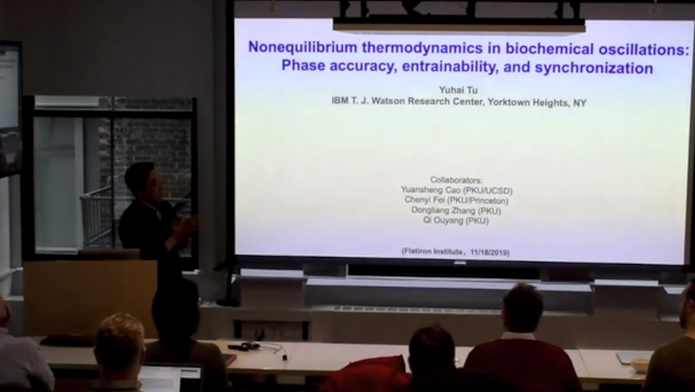CCB Seminar: Yuhai Tu
Topic: Nonequilibrium Statistical Physics of Biochemical Oscillators: Phase Accuracy, Entrainability, and Synchronization
Abstract: A central question in biology is how living systems manage to process information and perform vital functions (replication, gene regulation, development, signaling, etc.) accurately by using inherently noisy biochemical components and reactions. What are the molecular mechanisms for control? What are the design principles for the underlying biochemical networks? What are the energy costs for regulation? In this talk, we will present some of our recent work in addressing these general questions in the context of biochemical oscillators from a nonequilibrium thermodynamics perspective. We will first briefly describe two previous work on the molecular mechanism and energy cost for enhancing phase accuracy of biochemical oscillators [1], and the design principles for oscillatory biochemical networks to achieve both high entrainability and low phase fluctuations [2]. We will then focus on discussing our most recent work on the nonequilibrium thermodynamics of synchronization of coupled molecular clocks [3].
[1] “The free-energy cost of accurate biochemical oscillations”, Y. Cao, H. Wang, Q. Ouyang, and Yuhai Tu, Nature Physics, 11, 772, 2015.
[2] “Design principles for enhancing phase sensitivity and suppressing phase fluctuations simultaneously in biochemical oscillatory systems”, C. Fei, Y. Cao, Q. Ouyang, and Yuhai Tu, Nature Communications, doi:10.1038/s41467-018-03826-4, 2018.
[3] “Nonequilibrium thermodynamics of coupled molecular oscillators: The energy cost and optimal design for synchronization”, Dongliang Zhang, Y. Cao, Q. Ouyang, and Yuhai Tu, Nature Physics, 10.1038/s41567-019-0701-7, 2019.
About the Speaker
November 18, 2019
Yuhai Tu: Nonequilibrium Statistical Physics of Biochemical Oscillators: Phase Accuracy, Entrainability, and Synchronization

By clicking to watch this video, you agree to our privacy policy.